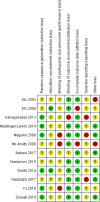Effectiveness of interventions on early neurodevelopment of preterm infants: a systematic review and meta-analysis
- PMID: 33926417
- PMCID: PMC8082967
- DOI: 10.1186/s12887-021-02559-6
Effectiveness of interventions on early neurodevelopment of preterm infants: a systematic review and meta-analysis
Abstract
Background: As preterm infants' neurodevelopment is shaped by NICU-related factors during their hospitalization, it is essential to evaluate which interventions are more beneficial for their neurodevelopment at this specific time. The objective of this systematic review and meta-analysis was to evaluate the effectiveness of interventions initiated during NICU hospitalization on preterm infants' early neurodevelopment during their hospitalization and up to two weeks corrected age (CA).
Methods: This systematic review referred to the Preferred Reporting Items for Systematic Reviews and Meta-Analyses [PRISMA] guidelines and was registered in PROSPERO (CRD42017047072). We searched CINAHL, MEDLINE, PubMed, EMBASE (OVID), Cochrane Systematic Reviews, CENTRAL, and Web of Science from 2002 to February 2020 and included randomized controlled/clinical trials conducted with preterm infants born between 24 and 366/7 weeks of gestation. All types of interventions instigated during NICU hospitalization were included. Two independent reviewers performed the study selection, data extraction, assessment of risks of bias and quality of evidence.
Results: Findings of 12 studies involving 901 preterm infants were synthesized. We combined three studies in a meta-analysis showing that compared to standard care, the NIDCAP intervention is effective in improving preterm infants' neurobehavioral and neurological development at two weeks CA. We also combined two other studies in a meta-analysis indicating that parental participation did not significantly improve preterm infants' neurobehavioral development during NICU hospitalization. For all other interventions (i.e., developmental care, sensory stimulation, music and physical therapy), the synthesis of results shows that compared to standard care or other types of comparators, the effectiveness was either controversial or partially effective.
Conclusions: The overall quality of evidence was rated low to very low. Future studies are needed to identify interventions that are the most effective in promoting preterm infants' early neurodevelopment during NICU hospitalization or close to term age. Interventions should be appropriately designed to allow comparison with previous studies and a combination of different instruments could provide a more global assessment of preterm infants' neurodevelopment and thus allow for comparisons across studies.
Trial registration: Prospero CRD42017047072 .
Keywords: Interventions; Meta-analysis; NICU; Neurodevelopment; Preterm infants; Systematic review.
Conflict of interest statement
The authors declare that they have no competing interests.
Figures






References
Publication types
MeSH terms
LinkOut - more resources
Full Text Sources
Other Literature Sources
Medical
Research Materials

